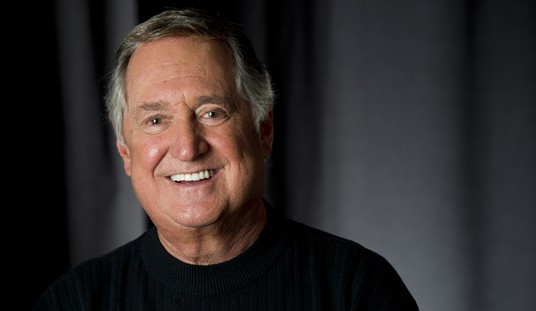If you’re looking for the interview, it is at the bottom of this post.
Talk radio has played an indelible role in the conservative movement in America since the late 1980s. It started with the rise of Rush Limbaugh, but it is not just him that has kept it around. There are plenty of other major names that have made the genre what is today, including Sean Hannity, Mark Levin, Glenn Beck, Hugh Hewitt, Laura Ingraham, and even our own Erick Erickson, among so many others, but conservative talk radio existed long before Rush came around. Author and TheBlaze White House correspondent Fred Lucas‘ book The Right Frequency: The Story of the Talk Radio Giants Who Shook Up the Political and Media Establishment seeks to chronicle the history of right-wing talk radio from its beginnings up until the present.
After a brief survey of the role talk radio has played in leading the Republican Party and its supporters since President Barack Obama’s election, Lucas jumps into the history of the earliest days of the genre. His story essentially begins with Calvin Coolidge signing the Radio Act of 1927, which established the Federal Communications Commission through the Presidency of Franklin Roosevelt and ending with the fall of Senator Joseph McCarthy. The commentators he focuses on are hardly doctrinaire conservatives, but they all appealed in some way to conservatives of the day or at least to certain strands of populism that existed on the right. Hans von Kaltenborn, Father Charles Coughlin, and Fulton Lewis, Jr., are given special attention for their roles in shaping the genre. Lucas also notes Walter Winchell’s role in creating the concept of “Info-tainment”.
Subsequent chapters discuss the history of talk radio from the 1960s up to the late 1980s, from the lonely days when Barry Goldwater was thrashed by Lyndon Johnson in the Presidential election of 1964 and the Fairness Doctrine was in full force all the way to the fall of that policy and events during the Reagan administration. He singles out many for recognition, among them are Clarence Manion, Dan Smoot, the Revs. Carl McIntire and Billy James Hargis, Marlin Maddoux, Bob Grant, Dr. James Dobson, and Neal boortz. He also discusses the varying approaches notable radio hosts during this period took. As an example, he discusses the importance of talk radio from a conservative Christian perspective, as done by McIntire, Hargis, Maddoux, and Dobson, and the role it played in shaping conservative talk radio as a whole.
After this, he devotes a chapter to discussing a policy employed by Democrats during the Johnson administration called “Challenge and Harass”, which singled out conservative talkers for supposed violations of the Fairness Doctrine. It was a very successful policy in driving hosts off the air, as stations did not want to deal with the potential legal issues that could arise as a part of these complaints. It is a chapter whose lessons are still very much relevant today, and it is one of the most important chapters of the book for activists to learn from.
Lucas then turns his attention to the renaissance the genre underwent once the Fairness Doctrine was repealed. A key part of this renaissance was the rise of Rush Limbaugh and how he revolutionized all of talk radio, conservative and other genres (although Lucas’ focus is exclusively on the former). He also discusses the fat days of the 1990s, when many major talkers we hear today first hit it big, particularly Michael Reagan, Michael Medved, Dennis Prager, and Mike Gallgher, and the role talk radio played in the Revolution of 1994 and holding the Clinton administration accountable.
Next, Lucas moves onto the Bush administration and the love-hate (or love-strong dislike, in most cases) relationship conservative talkers had with George W. Bush. While the hosts were largely, as Lucas notes, supportive of Bush’s War on Terror and his tax cuts, they generally soured on him during his second term, particularly thanks to Harriet Miers and immigration reform. Lucas surprisingly does not mention issues conservative radio hosts had with the bailouts and TARP at the very end of Bush’s Presidency, but regardless, he makes his point about the talk radio’s feelings about the President well. In this chapter, the author singles out, among others Sean Hannity, Hugh Hewitt, and Laura Ingraham for their roles in rallying conservatives during this era.
The next two chapters step away from the national conservative talk radio scene and look at other important issues. One of these chapters discusses why Leftwing talk radio has failed to take off, including the failure of Air America and the inability of other hosts like Jim Hightower to find a real national voice on the scale of their conservative rivals. Activists can learn much from Lucas’ discussion of the role local radio hosts played in rallying conservatives to oppose overreaches by state governments, such as the 2001 Tennessee Tax Revolt and the Citizen Gabriel affair in Oregon in 2007.
The final chapter of this book steps back to the national conservative talk radio scene again and discusses events in the genre’s history in the most recent times. Particular attention is paid to the rise of the Tea Party and the talkers who led the charge, especially Mark Levin, Glenn Beck, and as usual, Rush Limbaugh. The final major event in this book is the 2010 election, when conservatives played a decisive role in returning the Republican Party to power in the House with the largest majority either party had enjoyed since the Truman administration, as well as a gain of seven Senate seats, which brought the GOP close but only a few seats shy of a majority. As part of this, he notes the role talk radio played in garnering support for Scott Brown, Marco Rubio, and Rand Paul, which might be the most tangible results of its efforts during this election.
Fred Lucas has written an excellent book. He has researched his topic thoroughly, and it shows when you look at the bibliography. He relies extensively on primary sources to build his narrative, so you are getting to hear what the major players actually said, not some third-party account written some time after the fact. There is much to learn in this book for everyone, and I feel comfortable saying that I feel much more educated on the subject now than I did before reading the book. While some might criticize it for not being a “scholarly” history in its general, Lucas is not writing to please a small Ivory Tower clique. He is writing for the general public, and he does this job well. He writes about a subject conservatives need to know about, and he does it in a very readable and accessible way. This is no mean feat for a work of history.
With all this said, it is important to note that this is not a perfect book. In addition to not discussing the role talk radio played in the opposition to the bailouts and TARP, Lucas also fails to provide a true conclusion to this book. The book merely ends off with the section discussing Glenn Beck. Also, it is apparent that this book should have gone through an extra round of proofreading and editing. There are several typographical errors throughout it, along with a few awkward phrases. The book also comes off as something of an extended op-ed column at times. One should not blame Lucas too much for either of these two things. He is a journalist, so writing in such a way is his style. As for the editing and proofreading, when a person writes a long work such as this, it is entirely expected that it will not be perfect, and editors are the people who are specifically paid to single out and fix these issues.
Stylistic concerns are ultimately minor as long as a book is readable–and this one certainly is–and whatever issues there are with the substance do not prevent a person from getting a good understanding the overall narrative. In all, this is a book that belongs on the shelf of any conservative who wants to learn about the history of talk radio, and the lessons here can easily be applied to our own time and the future. Lucas takes a subject that has not been studied much before at this length, and he chronicles it in a way that almost anyone can follow. His writing style is exciting to read, and he maintains its consistently good quality throughout the book. Whatever my criticisms of this book are, they are dwarfed by my praise for it. It is a work that is absolutely worth buying, and it has not been a consistent top seller in books on radio on Amazon.com for nothing.
I give it a rating of 4 out of 5.
Mr. Lucas was kind enough to join me for an interview about this book. In our discussion, we talk about the role talk radio has played in the defeat of Eric Cantor and the rise of Chris McDaniel in the Mississippi Republican Primary against Thad Cochran. Of course, we also discuss in depth just what Lucas’ book is about. I do apologize for the quality of the recording. It is from my computer’s microphone, and the interview was done via Google Voice. Occasionally, you might hear some stuff moving around on my desk as well.
In addition to your thoughts on this review and interview, I am interested in seeing how you feel about reviewing more books in the future. Thoughts?












Join the conversation as a VIP Member